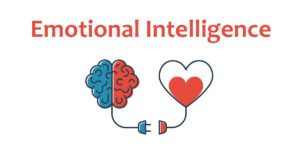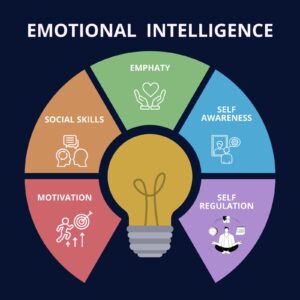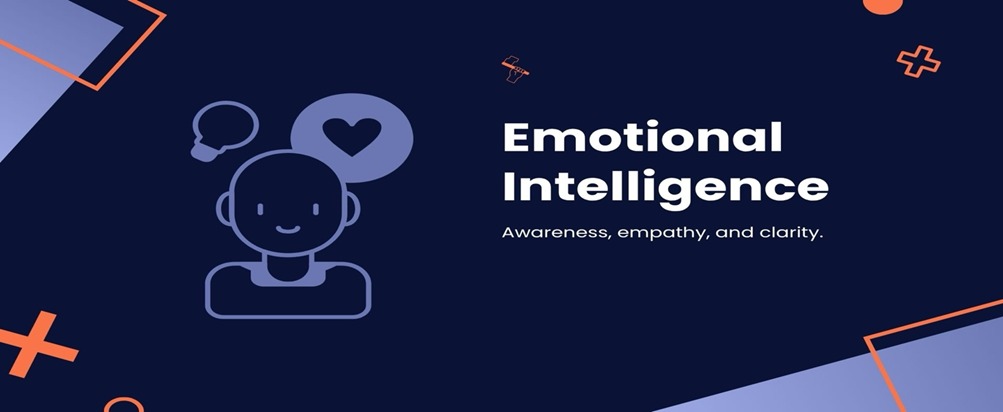In todays fast paced life we often forget to pause and reflect upon our feelings and fail to acknowledge how the people we interact with are feeling. This is where emotional intelligence comes into play.
What is emotional intelligence?
Emotional intelligence also known as the emotional quotient, is the ability to understand, use and manage your own emotions, as well as recognizing and influence the emotions of others. This ability empowers you to relieve stress, communicate with clarity, empathize with others, overcome obstacles, and defuse potential conflicts before they escalate. It encompasses self-awareness, self-regulation, motivation, empathy and social skills. Individual with high EI can navigate social situations effectively, build stronger relationships, and achieve personal and professional goals. It offers a pathway to reconnect with your own feelings—transforming intention into purposeful action and supporting thoughtful, well-informed decision-making about what truly matters in your life.

Why is emotional intelligence important?
Emotional intelligence holds great importance in both our personal and professional lives. Those who develop their EI often experience improved relationships, as they are better equipped to build trust, foster understanding, and create meaningful connections with others. In the workplace, EI is a crucial driver of career success: it enhances leadership abilities, facilitates productive teamwork, and allows individuals to skillfully navigate complex workplace dynamics.
Beyond external interactions, EI also plays a vital role in mental wellbeing. By recognizing and regulating emotions, individuals can manage stress more effectively, cope with life’s challenges, and support their overall mental health. Furthermore, emotional intelligence is essential for sound decision making. When we understand our own emotions and those of others, we can approach choices with clarity and empathy, leading to more thoughtful and effective outcomes.
Components of emotional intelligence

Self Awareness – Recognizing your own emotions and how they affect your thoughts and behavior. Self-awareness involves tuning into the subtle shifts of your inner world, recognizing how feelings might color your thoughts or influence your actions.
Self-Regulation – Managing your emotions and impulses in healthy ways, adapting to changing situations. Self-regulation is about channeling these emotions constructively, maintaining composure and flexibility even when confronted with change or adversity.
Motivation– Using emotions to drive you towards your goals and help you persevere through challenges. Motivation acts as an inner compass, fueling ambition and resilience, guiding you forward despite setbacks.
Empathy – Understanding the emotions of others and responding with compassion. . Empathy, the capacity to sense and appreciate the emotional currents in others, fosters kindness and deepens social bonds.
Social Skills – Effectively communicating, managing conflict and building strong relationships. social skills encompass the art of communicating with clarity, resolving conflicts diplomatically, and nurturing meaningful relationships in both personal and professional spheres.
Taken together, these five components form the foundation of emotional intelligence.
How to improve emotional intelligence?
Improving your emotional intelligence is a continuous process that can yield profound benefits. Fortunately, emotional intelligence isn’t a fixed trait; rather, it is a dynamic skill that can be developed with intentional practice over time. Much like learning a new language or refining a craft, cultivating emotional intelligence requires patience, curiosity, and self-compassion. The following strategies offer practical steps to help nurture stronger emotional intelligence in everyday life:
- Practice Self-Reflection: Regularly take time to observe your emotional responses and consider how they influence your actions. Ask yourself what went well, where you could improve, and how your feelings may have influenced your behavior. This process of introspection helps build greater self-awareness and lays the foundation for personal growth.
- Develop Empathy: Make a conscious effort to see situations through the eyes of those around you. Empathy is more than understanding—it’s about feeling alongside someone and honoring their experiences. Practicing empathy nurtures trust and connection, both in your personal life and at work.
- Manage Your Emotions: Work on regulating your reactions, especially during stressful moments. Instead of reacting impulsively, pause and choose responses that align with your values and long-term goals. This self-regulation supports better outcomes and healthier interactions.
- Seek Feedback: Invite constructive and honest feedback from colleagues, mentors, or supervisors regarding your communication and interpersonal effectiveness. View this input as a valuable resource for discovering blind spots and accelerating your growth. Embracing feedback with openness and humility can accelerate the development of your emotional intelligence.
- Practice Active Listening: Focus your attention fully on the speaker, observing not only their words but also their body language and tone. Maintain eye contact, avoid interrupting, and truly strive to grasp not only their words but also the underlying emotions. By listening deeply and without interruption, you show respect and can better understand the emotions and intentions behind their message.
- Regulate your emotions: Learn to identify and manage your emotional states, especially in high-pressure or stressful situations. Mindfulness practices like deep breathing, grounding exercises, and reframing negative thoughts can help you maintain composure and respond thoughtfully rather than react impulsively.
By incorporating these strategies into your routine, you’ll gradually strengthen your emotional intelligence and pave the way for more resilient, authentic, and rewarding relationships and create more meaningful connections with the people around you.





Leave a Reply